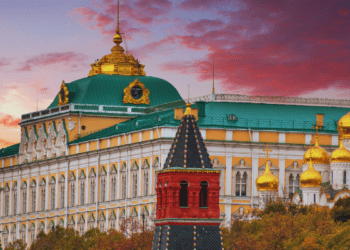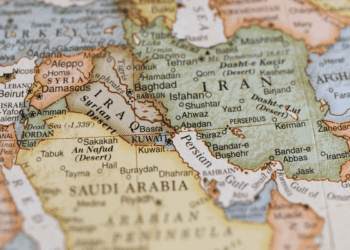On April 2, the Christian Science Monitor reported the news that British Prime Minister Gordon Brown had called an election for May 6, 2010 with a comment on “the Americanization of Britain”.
This is a trend that the British themselves have worried about militarily, culturally, economically, and now politically with varying degrees of alarm since at least the end of the Second World War. Of course, in this the Brits must acknowledge that Canada got there first, with concerns about the Americanization of Canada pre-dating Confederation.
Seen from my perch as a Canada-watcher in the United States, though, the trend in the United Kingdom seems to be the gradual Canadianization of Britain. Three recent developments in British politics seem more Canadian than American to me.
First, there is the introduction of televised leaders’ debates as a new feature of British parliamentary election campaigns in 2010. True, the United States had its first televised debate among presidential candidates in 1960 – the famous debate where radio listeners thought Republican candidate Richard Nixon won, but his shifty eyes, nervous fidgeting, and five o’clock shadow put off television viewers who rated John F. Kennedy the winner of the contest and ultimately Kennedy went on to win the election.
In 1962, Radio-Canada broadcast the first televised leaders’ debate in Canada between Daniel Johnson Sr. and Jean Lesage, three days before a provincial election. The CBC and CTV networks co-sponsored the first televised leaders’ debate in a federal election in 1968, and like the recent British leaders’ debates, the 1968 debate featured three leaders: Liberal Pierre Trudeau, Progressive Conservative Robert Stanfield, and Ed Broadbent of the NDP. The Canadian debates were closer to what Britain is trying in 2010, because they were an adaptation of the U.S. model to the parliamentary system. In the United States, eligible debate viewers would eventually have the opportunity to vote for either candidate; in a parliamentary system, the leaders debating are not actually contesting the same seat – instead, they appear as party champions that few viewers will be able to vote for or against. In a practical sense, Britain is imitating Canada more than the United States.
A second example of Canadianization in Britain can be seen in the debate about Britain’s role in the world, and its “special relationship” with the United States. This did not start with the 2010 election cycle, and in some sense the British have been having this debate since 1776. But Prime Minister Tony Blair stole a page from the Canadian prime minister’s playbook by positioning himself as the United States’ most loyal and reliable ally after September 11, 2001 – and, in a very Canadian way, then sought influence on U.S. policy from “within the tent.”
Lately, as Britain has sought a reflection of itself in pop culture, and world affairs, uneasiness about the state of British identity has emerged. Canadian slogans such as “A Canada at home in the world and respected abroad” or “The world needs more Canada” may soon be adapted for British use.
The obsession with the relationship between the U.S. president and the prime minister is common to British and Canadian media. So is ambivalence about being a principal ally of the United States without becoming a policy poodle. Culturally, many commentators lament that the top British and Canadian talent in music, acting, and other arts heads to the United States – while at the same time feeling proud that a compatriot has won recognition, in a sense for the whole country, by succeeding on the grand American stage.
Again Canada got there ahead of Britain; in Canada, proximity and asymmetry made comparisons with the United States inescapable. Yet as globalization has made the English-speaking world smaller, now Britain experiences similar feelings.
Finally, depending on the outcome of the May 6 election in Britain, the political situation at Westminster may come to more closely resemble Ottawa than Washington. Many observers are predicting that the election will produce a “hung parliament” with no party holding a 50 percent-plus-one majority of seats. In Canada, where the third minority government in a row holds power, a hung parliament has become a familiar feature. Obviously there is no equivalent of a hung parliament or minority government in the United States. The unique handicap this puts on a government is not matched by divided government – when one party holds the presidency and another controls the Congress.
Canada has shown that under minority governments it is still possible to have an assertive policy toward the United States when it comes to defending national interests – on the “Buy American” provisions of the U.S. stimulus, or with regard to Afghanistan, to cite just two salient examples. The next British government need not assume that a hung parliament will force Britain to acquiesce to Washington’s demands, not paralyze its ability to contribute as a staunch ally of the United States when circumstances warrant.
There is a kind of genius to Canadian politics, which draws from the spirit of the Canadian people, which has generated innovative, imaginative, and often surprising ways to adapt the best of the American model to life in a parliamentary democracy without losing what is essential to Canadian identity. Part of this genius is a constant worry about striking the right balance between positive change and cultural surrender. Rather than accept that “if you can’t beat ’em, join ’em” is the only option, and at moments of national insecurity or political weakness, the ineluctable force of Americanization will prevail, Canadians have shown that it is possible not to Americanize, and to take what is most appealing from the American experience without losing your identity.
I think many in Britain will find, particularly after May 6, that they might draw considerable inspiration – and even encouragement – from the resourceful and largely successful Canadian experience coping with the United States.
Stop the Americanization of Britain! Let the Canadianization of Britain begin!
Christopher Sands is a Senior Fellow at the Hudson Institute and a member of the Research Advisory Board of the Macdonald-Laurier Institute.




